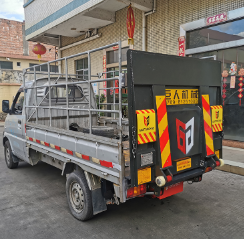1、 Pre operation inspection
Appearance inspection
Before using the truck tailboard, the appearance of the tailboard should be inspected first. Check if there are any obvious damages on the surface of the tailboard, such as deformation, cracks, etc. At the same time, check whether the various connection parts of the tailboard, including the connection bolts and hinges with the truck carriage, are loose. If any components are found to be damaged or loose, they must be repaired or tightened first to ensure the integrity of the tailboard structure.

Hydraulic system inspection
Check the hydraulic oil level. Low liquid level may cause the tailboard to malfunction or reduce work efficiency. The liquid level can be checked through the level gauge on the tailboard hydraulic oil tank. If the liquid level is insufficient, hydraulic oil that meets the regulations should be added.
Check for leaks in the hydraulic pipelines. Carefully observe the joints of the hydraulic pipeline, the surface of the oil pipe, and other locations for oil stains. Once a leak is found, it is necessary to repair or replace the damaged oil pipe in a timely manner.
2、 Upward operation
Start power supply
Ensure that the truck engine is running or the independent power supply for the tailboard is turned on to provide power to the hydraulic system of the tailboard.
Operation control buttons
Find the up control button for the tailboard, usually located in the control box on the side or bottom of the tailboard. Press the up button, the hydraulic system will start working, and the tailboard will slowly rise. During the ascent process, the operator should constantly observe the operation of the tailboard to ensure that it rises smoothly without any abnormal shaking or tilting.
3、 Lowering operation
Preparation for loading and unloading of goods
After the tail board rises to the appropriate height, place the goods to be loaded and unloaded on the tail board. Please note that the weight of the goods should not exceed the rated load-bearing capacity of the tailboard, and they should be evenly placed to prevent uneven stress on the tailboard.
Lowering operation
Press the descent control button on the tailboard, and the tailboard will descend at a stable speed. During the descent process, it is also important to observe the operation of the tailboard. When the tailboard approaches the ground, it is necessary to slow down the descent speed appropriately to avoid damage caused by collision between the tailboard and the ground.
4、 Folding and Storage
After the completion of loading and unloading of goods
If it is necessary to retract the tailboard, first ensure that there is no cargo residue on the tailboard and it is in a fully lowered position. Then, according to the folding design of the tailboard, operate the folding control button or manually push the folding part of the tailboard to fold it up and store it in a fixed position at the bottom of the truck.
Check the storage condition
Check if the tailboard is securely stored to prevent it from loosening or accidentally unfolding during vehicle operation.

Professional to provide security
for modern logistics
A new company that efficiently handles
and unloads equipment
Please do not hesitate to contact us
0769-81251088

Add friend consultation